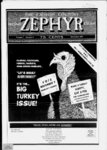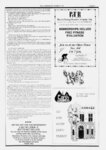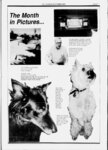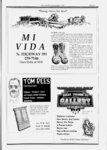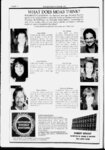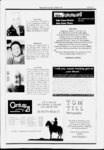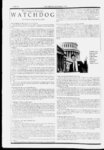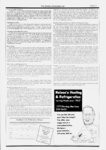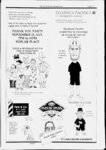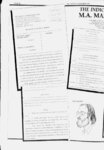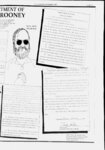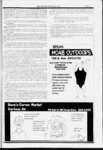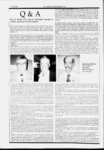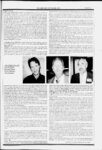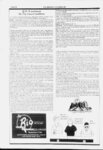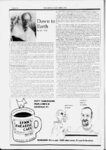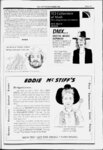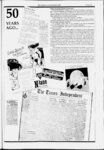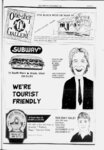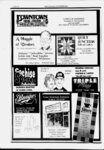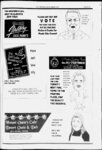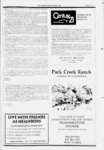| OCR Text |
Show PAGE 34 THE ZEPHYRNOVEMBER 1995 FEEDBACK The readers respond ... after it disappears from our curb. Both situations arc variations of the "out of sight, out of mind" scenario, a perceptual process that's part of human nature. Imagine if you kept giving a little child more of something no matter how much he used or wasted, and cleaned up after him so he would never have to live with the consequences of his own mess. That's what a variety of industries have been doing for us the past few decades. We've been encouraged to be spoiled, demanding, with regards to the environment. For gluttonous, overindulgcnt, and example, we think about a gallon of gas now being $135, not that each one we bum puts 20 pounds of carbon dioxide into the air. It's not healthy for any of us in the long run. I often ask students, "If your behavior could talk, what would it say?" Our behavior as passengers on this planet often seems to say things like, "There'll always be more", "More is better", "This little bit won't hurt", and "It's a big planet". The problem is, these things aren't really true. And, we are headed for problems sooner or later. Even if we wanted to roll back, the problem is that there are always people who perceive themselves as HAVE NOTS and others as HAVES. And, it doesn't matter how much someone really has. Ask people to give up something, or settle for less, and they likely will refuse because they desire, or even DEMAND that they have the same as the HAVES. You even start treading on the issue of freedom. Like teenagers, we want freedom, but don't want to have to assume the responsibility that goes with it. Responsibility to the natural world we're ultimately dependent on. We often perceive the environment as something that is hostile and that we must conquer. Given living conditions in the past, or even for most people on this planet in the present, that view is understandable. However, mix this with the new found power we have acquired through technology and more problems arise. Power is or bulldozer you want to use it, and DO intoxicating. If you have a gun, chain-sasomething. This power is new in terms of human history. We inevitably misuse it. Human nature again. Like giving a car or a gun to a child. Our behavior often seems to say, "We can make it better", "We can improve on Mother Nature" or "It has to be perfect" perfect fruit, lawns, and so on. We arc often guilty of "tunnel vision" as we proceed. We can't sec the Big Picture. We have blinders on or arc nearsighted. Another ancient root to the problem is that we believe it was all put here for us by Cod as we each know him. Remember Manifest Destiny. Our behavior seems to say things like, "Animals arc dumb and were just put here for us", or "We own it, and should be able to do whatever we want with it", "We have to develop the land God gave us". Try to talk someone out of believing that. Native Americans believed otherwise and look what it got them. The bottom line is that many things in the Big Picture arc not entirely compatible. Having shelter, jobs, profits, economical growth, comfort, conveniences, and pleasure are often at odds with things like open space, wilderness, public lands, wildlife, dean air, water, and food. The present is often at odds with the future. Tough choices must be made. They're going to get tougher in the future as resources decrease and population increases. No matter what side you're on, it's important to remember that "There really is no such thing as a free lunch." This is not a new dilemma we arc faced with. Ancient civilizations faced the same one. Unfortunately, humans don't have a great track record for handling this one. And, now there's more of us than ever before, we are more demanding of comfort and convenience, and we have a greater capacity to impact the natural world than ever self-center- ed Dear Jim, My free subscription is almost up so I figured I had better try for Letter of the Month again. Just kidding. Actually, I'd rather pay you the $15 so I do my part to keep your paper going. We just returned to Illinois from another summer in Utah. Unfortunately, another summer passed without running into you somewhere in Moab. Each year when we make 2 or 3 trips from Illinois to Utah and back, we can't help but notice the growth. The thought that always comes to mind is that most of this wasn't here a mere 100 years ago! Where did all this come from? The steel, concrete, asphalt, glass, plastic, the brick, lumber and so on? Where's all this headed? More houses, more buildings, more nails, more cars, more trucks? Part of my job is to teach Environmental Health. One of the things I try to show students is the Big Picture of how and why things have gotten the way they have. I'm hoping that a picture is worth a thousand words, so I've simply enclosed a visual I use. To summarize what's there. I'll quote a poster. "When you try to pick out find it to connected something, you everything else." To be fair, I attempt to show students that there really are no villains in the story, just fallible human beings who tend to get nearsighted in their quest for what they truly need to survive. And, who convince themselves they need and must have something they just really want or desire or that would be nice to have. In the process, they inadvertently poison the very things they do need - air, water and food -and rob themselves of other things, like open space, that they come to value as after it's gone. The problem is really human nature. We develop tolerances for everything. When people are uncomfortable, they can learn to tolerate much more than they thought they could in the beginning. That could be a good thing. Unfortunately, it also means they learn to tolerate bad air and many other forms of pollution too. It's even more likely because such things worsen slowly and are often invisible. The other way it works against the environment is that we also develop tolerances for convenience, comfort, pleasure, power and It takes more to give us the money. same sense of satisfaction as a lesser amount did before. There's nothing wrong with wanting any of these things. Unfortunately, because we develop tolerances, we begin to comince ourselves we can't live without things we now have oven though we once did, or that we NEED more. And, we convince ourselves it would be AWFUL to be without them. Not just inconvenient or uncomfortable, but the end of the world. The big problem is that everything we have and experience is ultimately dependent on natural resources. And, they are limited and finite, despite appearances to the contrary. Add in exploding population and something has got to give sooner or later. If we could somehow give back to the natural resources it would help, but we really can't. They must replenish themselves. We can only help. When I was a kid, we heard so much about conserving our natural resources. You don't hear that anymore. All this STUFF just keeps showing up in stores. Most of us don't know where it comes from, or what environmental costs are paid to get it to us. We just know it keeps showing up no matter how much we consume. If you've got the bucks, you can get it. Or, in the case of water, it usually keeps coming out of the faucet or spigot no matter how much we waste. The other side of it is that no matter how much waste we produce, it just keeps disappearing. Most of us don't know where it goes, and don't have to deal with it -- before. there'll be battles. Sides will be drawn. It's not a new conflict. The stakes arc just higher than ever before. There'll be wins and losses for all sides. No one will probably be satisfied all the time. There might be compromise, but in the Big Picture, that just forestalls some inevitable problems brought on by a rising population and dwindling resources. It probably won't be resolved in our lifetimes, so we hopefully So, DESERT PLAZA (Next to City Market) BREAD ROT BR 12-- 7 MON-F- 10-- 4 Saturday RI CANYON NURSERY 275 Williams Way 471 South Main Closed Sunday HONEY WHOLE WHEAT 12-GRA- IN ORANGE PARADISE RAISIN-NU- T SOURDOUGH GARLIC COOKIES CINNAMON ROLLS WHO NEEDS THE TRAM? WALK THE SIDEWALK TO NOWHERE... IT'S FREE! 259-82- 74 |
